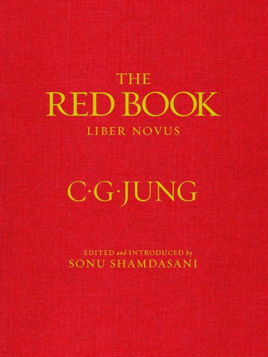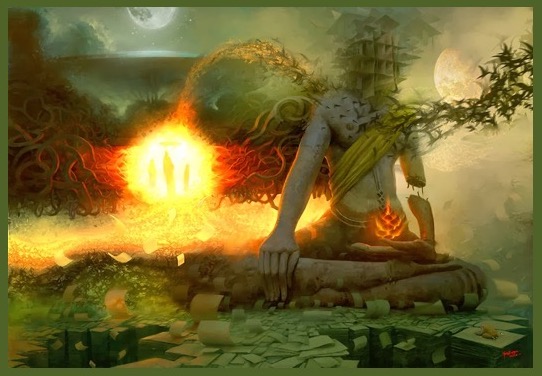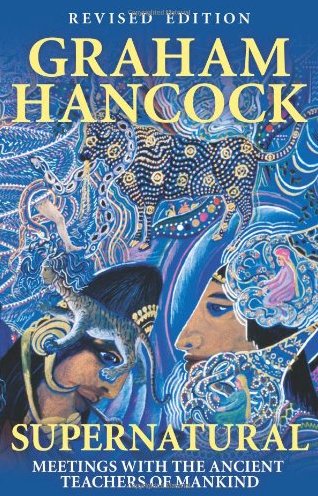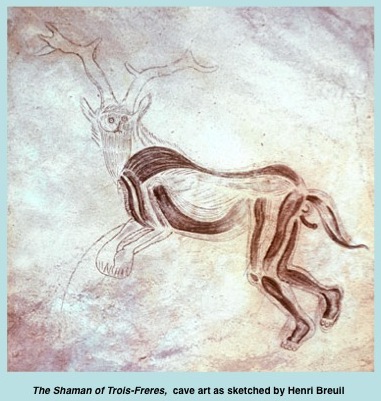
An essay, containing secrets that really aren’t secrets.
Yes, I know that Carl Jung is a deeply flawed human being, but his philosophy explains the world to me better than anyone else I’ve encountered. He makes poetic sense of the twisted labyrinth of human consciousness—and it requires poetry rather than logic to explore those paths. Besides, who better to act as shaman on such a journey than a flawed human being?
(Psst. Here’s a secret: no living, breathing human being is without flaws. Purity is not possible in the earth realm. And, in fact, shamans in tribal society are often “other†and strange and outcast people. They make the best interpreters of the less-than-upright world of the spirit and alternate realities.)
I have other shamans I listen to, other paths I explore, but always swing back to ol’ Carl. I don’t swallow his philosophy—or anyone’s—whole. (The story of “The Emperor’s New Clothes†is an active metaphor in my psyche.) But I do use Jung’s work as a basis for my own worldview and personal explorations.
(Psst. Here’s another secret: any philosophy worth its salt is a means for discovering your own way of looking at the world, not something slavishly to be followed. Anyone who tells you to walk in lock step or that you must attain righteous purity is probably a spiritual fascist.)
(Psst. There are many valid spiritual paths. What matters is finding the one that gets you closest to the mountaintop.)
I even went so far, in my flush days, of purchasing the complete facsimile edition of The Red Book when it was issued in the earlier years of this century. (It’s almost doubled in price since.) It was so visually amazing that I had this idea to display it open on a library pedestal so I and my guests could page through it if they had a hankering. I don’t know if that’s pretentious or not. I suspect it is, but at the time, it just seemed neato kobeato. And now I’m past giving a damn what people think, anyway.
That idea never came to fruition, however. First, because we had a bird at the time who flew freely through the house. Anyone with even a rudimentary knowledge of birds knows they can’t be potty trained. Need I spell out the possibilities of open display of an expensive book in a house of fluttering birds? The bird, certainly, could not be contained in a cage, at least not during daylight hours. That would have been a violation of her spirit. And a metaphor, of course.
The second and more practical reason why I never got around to displaying it was because I never got the library pedestal and because I fell headlong into the emotional and physical pit of caregiving for many years. The bird, bless her, went to the sky gods a few years back and is no longer a risk to my book. But. It took me a long time to crawl out of the hole I existed in. In some ways, I am still crawling, though I think I may finally be sitting on the lip catching my breath before getting up and moving on. My energy, both psychic and physical, are still not at full strength. I will get there (or some form of there anyway) unless I croak first, but my feet are not quite resting on the earth yet.
Meanwhile, The Red Book gathers dust in a safe location. I have cleared a space in the living room for it, but must wait for an appropriate book stand, mostly for financial reasons. There’s another metaphor lying underneath that dust and waiting, but I’m not going to pursue it here.
Meanwhile meanwhile, my dreams are fertile again, full of archetypes and sendings from the Universe and conversations with muses and the dead. Dr. Jung, with one foot planted on mucky earth and the other in the Other, helps me interpret them in a way that Freud never could. In his stumblings down the crooked path of his life, he made ancient wisdom acceptable to (if not accepted by) academia. He prowled the borders of liminality, pulling hidden lore into the light. This made many academics (who are a conservative lot) deeply uncomfortable, but he did more to make the study of folklore and alchemy and such things valid to them as subjects of learning than anyone else in the early 20th century.
So, I cast a skeptical eye on the trickster nature of the man, but am deeply appreciative of the magus.






